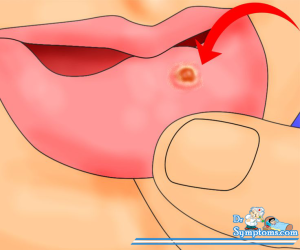What Is Canker Sore
Forget everything you have ever heard about canker sores. Most of it is wrong. After 12 years of research on the subject, and interviewing hundreds of canker sore sufferers, I found there was so much misinformation being spread that it is time to dispel the myths.

Full disclosure: I am affiliated with the product Canker Cure. If you are certain you have canker sores and are just looking for a treatment then I suggest you visit DrSymptoms.com. The purpose of this column is to dispel the myths about canker sores, not to promote the product. I hope to do this while writing in a casual style so it does not come across as a medical textbook.
We need to first define canker sores. The technical name is recurrent minor aphthous ulcers. They are always located inside the mouth. If you have a sore just outside the mouth it is usually a cold sore, which is totally unrelated to a canker sore. There are other sores which can be located outside the mouth, such as impetigo, so it would be best to have a doctor diagnose the problem.
Canker sores, when left untreated, generally last from 10-14 days. They are white with a red halo around the edge and either flat or crater shaped. Most often canker sores are round and smaller than a pencil eraser, but sometimes can be elongated. There is another type of mouth sore, called major aphthous ulcer, which is much less common. As the name “major” implies, these things can get huge. They range in size from a dime to a quarter. I’ve even heard reports of some being almost as big as a half-dollar (if anyone other than coin collectors can recall what a half-dollar looks like).
The hallmark of a canker sore is the pain. For anyone who has never experienced it, this pain is truly unbelievable. If someone has a mouth sore which is questionable, try putting a few grains of salt on it. If this results in screaming pain, then it’s a canker sore. And we are talking about minor aphthous ulcers, smaller than a pencil eraser. It would be hard to comprehend how painful a major aphthous ulcer would be.
Despite what anyone tells you, canker sores are hereditary. They are inherited from one (or both) parents. Antibiotics have no effect on them. Anti-viral medicines have no effect on them. They cannot be spread by contact such as kissing, cannot be spread by saliva, and cannot be spread by using the toothbrush of someone who has the sores (although why you would want to do this, I don’t know).
The biggest misconception I encounter is that everyone thinks every mouth ulcer is a canker sore. For instance, I’ll be telling someone about my research and they will say “Years ago, when I would suck on a lemon drop I would get a canker sore, but then it would go away after 3-4 days.” I ask if it was extremely painful and they would say “No, not especially.” Then I have to explain that it was just a mouth ulcer, not a canker sore. First of all, a canker sore does not go away in 3-4 days without treatment. Second, canker sores are extremely painful. And finally, there is a reason they are called “recurrent” minor aphthous ulcers.
That’s because they keep coming back repeatedly. Admittedly a mouth ulcer and canker sore look very similar, so these other factors must be taken into consideration when making a diagnosis.
Keep in mind canker sores usually go away within 2 weeks. If you have a sore that hangs around for months, get to a specialist to have it checked out. Especially if you use any form of tobacco.
by Dr. Alexander Dominus
